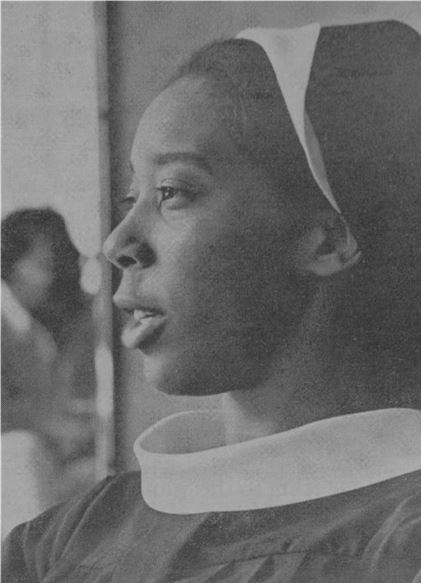
Sister M. Martin de Porres (Patricia Muriel Rita Francis) Grey, the first black woman admitted into the independent branch of the Religious Sisters of Mercy in Pittsburgh. She organized the National Black Sisters' Conference in 1968 following her exclusion from the Black Catholic Clergy Caucus. Grey led the NBSC until her departure from religious life in 1974. (Provided by Shannen Dee Williams)
Alone, or with a partner, consider:
-
It's not good to feel unwanted. How does it feel (or how might you think it feels) to be the last person chosen for a team or not invited to a party?
-
Recall (or imagine) a situation when you’ve been excluded. Did you (would you) wonder why you were left out? What reasons might there be?
How does exclusion hurt people – not just those who are excluded, but those who leave them out?
A sisters' community apologizes to one woman whose vocation was denied
A year before Shannen Dee Williams spoke at the 2016 Leadership Conference of Women Religious national assembly about her upcoming book on anti-black racism among Catholic sisters, she presented some of her research at a symposium in London. Sally Witt, a Sister of St. Joseph of Baden and fellow historian, sat in the audience and was aghast to learn from Williams that in 1960, her community had denied entrance to a woman because she was black.
When she returned to the United States, Witt emailed her president, Sr. Mary Pellegrino, who was equally surprised by the revelation. The woman in question — Patricia Grey — had gone on to become a Sister of Mercy in Pittsburgh (although she eventually left that community) and, in 1968, to found the National Black Sisters' Conference.
Pellegrino wondered if Grey would be open to hearing from her. With help from Williams, Pellegrino was able to get in touch with Grey, but it took Grey almost six months to return the phone call.
"It took that long because for the first time, what I really felt years ago was just unveiled, and I had to go through my own engagement with God," Grey said. "I never allowed myself to actually experience the pain of it."
After about a year of conversation, the two women met in April 2016, and Pellegrino apologized to Grey on behalf of the congregation. Pellegrino also presented Grey with a miniature replica of the Door of Mercy, which Grey now keeps in her living room.
Pellegrino also laid bare the story in a letter penned to her sisters and their associates.
"I really wanted to let them know that this is part of our history," she told GSR. "Like many communities, we have engaged in outreach and service in communities of color — particularly the African-American community — and at the same time, we denied entrance to black women."

The sisters who attended the first meeting of the NBSC in Pittsburgh in mid-August of 1968 (Provided by Shannen Dee Williams)
Reactions to the letter were a mixture of surprise and sadness. Pellegrino received an outpouring of phone calls and emails, and the discussion about how to move forward became part of the year of peace and nonviolence the congregation had already committed to.
The sisters know they can't change the past, but the challenge, Pellegrino said, is figuring out how that past informs the present.
"I think there's maturity in this, that we're able to tell a fuller story of our history," she said. "We're telling a truth that hopefully can have a healing effect, not only for other people, but perhaps for ourselves, as well."
Patricia Grey offered herself in service to God, but her gifts were denied because of her color. God gave her those gifts, as well as her color.
-
What would you say to her about this rejection?
-
What would you say to the person who rejected her?
-
What would you say to God?
Patricia Grey received a replica of the Door of Mercy.
-
How did Patricia Grey respond in the 1960s when a door was shut to her?
-
How did she open doors for others?
-
What opportunity does the door symbolize, both for her and for the church?
The Lord said to Samuel: How long will you grieve for Saul, whom I have rejected as king of Israel? Fill your horn with oil, and be on your way. I am sending you to Jesse of Bethlehem, for from among his sons I have decided on a king. But Samuel replied: "How can I go? Saul will hear of it and kill me." To this the Lord answered: Take a heifer along and say, "I have come to sacrifice to the LORD." Invite Jesse to the sacrifice, and I myself will tell you what to do; you are to anoint for me the one I point out to you.
Samuel did as the Lord had commanded him. When he entered Bethlehem, the elders of the city came trembling to meet him and asked, "Is your visit peaceful, O seer?" He replied: "Yes! I have come to sacrifice to the Lord. So purify yourselves and celebrate with me today." He also had Jesse and his sons purify themselves and invited them to the sacrifice. As they came, he looked at Eliab and thought, "Surely the anointed is here before the Lord.” But the Lord said to Samuel: Do not judge from his appearance or from his lofty stature, because I have rejected him. God does not see as a mortal, who sees the appearance. The Lord looks into the heart. Then Jesse called Abinadab and presented him before Samuel, who said, "The Lord has not chosen him." Next Jesse presented Shammah, but Samuel said, "The Lord has not chosen this one either." In the same way Jesse presented seven sons before Samuel, but Samuel said to Jesse, "The Lord has not chosen any one of these." Then Samuel asked Jesse, "Are these all the sons you have?" Jesse replied, "There is still the youngest, but he is tending the sheep." Samuel said to Jesse, "Send for him; we will not sit down to eat until he arrives here." Jesse had the young man brought to them. He was ruddy, a youth with beautiful eyes, and good looking. The Lord said: There—anoint him, for this is the one! Then Samuel, with the horn of oil in hand, anointed him in the midst of his brothers, and from that day on, the spirit of the Lord rushed upon David. Then Samuel set out for Ramah.
-
What did God tell Samuel about the way in which God judges?
-
Spend a moment looking at the photo of Patricia Grey as a young sister. What can you tell about her? What might God see in her heart?
-
Some people might have struggled to imagine the great potential of young David or young Patricia Grey. What can we learn from their stories?
The bishops of the United States examine the conscience of the church in "Open Wide Our Hearts," their recent pastoral letter on racism. They write:
"Therefore we, the Catholic bishops in the United States, acknowledge the many times when the Church has failed to live as Christ taught—to love our brothers and sisters. Acts of racism have been committed by leaders and members of the Catholic church – by bishops, clergy, religious, and laity – and her institutions. We express deep sorrow and regret for them. We also acknowledge those instances when we have not done enough or stood by silently when grave acts of injustice were committed. We ask for forgiveness from all who have been harmed by these sins committed in the past or in the present."
"Open Wide Our Hearts: The Enduring Call to Love," (2018, page 22)
Like the Sisters of St. Joseph, the U.S. Catholic bishops have admitted their sins of racism and asked forgiveness. Seeking reconciliation is very humbling, especially when the sin is widely known and the confession is so public.
-
What do you think the church has learned from its mistakes and the process of reconciliation?
-
How might these experiences make the church stronger in its efforts to oppose racism in the future?
The Sisters of Mercy, the congregation into which Patricia Grey was accepted as a sister, oppose racism in all its forms and address it among themselves and in the communities in which they live and work. The Mercy Sisters share dozens of stories about their anti-racism efforts on their website. Explore their insights about transformation and be open to ways in which their perspectives might affect yours.
It's impossible to measure the costs of racism. The value of service to the church is priceless, so there’s no sum that can capture the value of opportunities lost when religious vocations were denied or delayed due to race. Some people believe, however, that descendants of slaves deserve financial reparation, payments to compensate for the enslavement of their ancestors. Legislation such as this has been introduced in Congress for more than three decades, and the effort recently has gained political momentum.
While politicians debate whether the government should pay for sins committed as far back as 300 years ago, a group of students has taken leadership of a more specific effort. In 1838, the Jesuit priests who ran Georgetown University in Washington, D.C., sold 272 slaves to pay off debts and keep the school open. Recently, Georgetown students voted to pay $27.20 per semester in reparations to the those slaves' descendants.
Research the issue of reparations and let your congressional representatives know what you think about it.
Help us, Lord, to look into the hearts of everyone we encounter.
Give us the wisdom to learn from the mistakes of our past, and the vision to look beyond the colors of people's skin.
Guide us to judge people on the content of their character and the gifts they bring to build up your kingdom.
Amen.
Tell us what you think about this resource, or give us ideas for other resources you'd like to see, by contacting us at [email protected]
